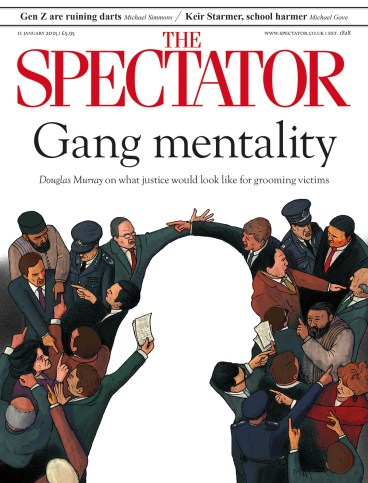
Growing problem
Sir: The first leading article of the year (‘Growing apart’, 4 January) points to the gap in economic growth between the US and the UK, while the first cover piece (‘Shift key’) identifies a shift rightwards in values and voting intention, in reaction to the bigger state model of Keir Starmer’s government. Sandwiched between the two is ‘Reeves’s new year’s resolution’, in which James Heale tells us of the Labour Growth Group, a WhatsApp group with 99 MPs that is only marginally more credible than a Turkeys for Christmas cabal. Have these Labour MPs studied the research cited in Jon Moynihan’s excellent Return to Growth? Has Rachel Reeves? Three chapters in particular go into great detail to show that: ‘The larger the government, the smaller the economic growth. The higher the level of tax, the smaller the economic growth. The greater the amount of regulation, the smaller the economic growth.’ If the Tories – who at least pretend they’re in favour of a smaller state, lower taxes and less regulation – stymied growth over the past 14 years, what chance has Labour ‘to spring Britain from its low-growth trap’?
Jon Wainwright
Cliburn, Cumbria
Comforting sign
Sir: Mary Killen’s reflections on visitors books (Notes on…, 4 January) brought to mind such a book at St Ethelbert’s Church, in a Suffolk hamlet. Its cover faded, the book lies beneath the current visitors book, sadly rarely signed, as the church hosts only occasional services. Intrigued by such an antique visitors book, I turned to its first page, from 1945. The second entry was by Harold Jeffreys, the third by Bertha Jeffreys. Google related that Harold, later knighted, had already discovered the structure of the Earth’s core, and that his wife was a world-renowned quantum theorist. I picture the cerebral pair happily cycling together from Cambridge University in the final year of the war. I have no way of knowing if the extraordinary married scientists were Christians, yet I find the scene and their surviving signatures rather comforting.
Brian Emsley
Kennett, Cambs
Sacred hunters
Sir: It is difficult to imagine the case for hunting being better put than in ‘Hounds of heaven’ (4 January). The spiritual dimension is often omitted but my mother, though not a regular or formal worshipper, always stoutly maintained that (fox)hunting, and presumably all other forms of hunting with hounds, was (and is) a ‘sacred occupation’. Young and heedless as I was, I took little notice, but more recently her saying has come to mind many times, most often as I hack home, when it is almost dark, in a holy glow of complete happiness and the certain knowledge that my horse and I have taken part in something very special. This culminates in the joy of seeing the lit stable ready to welcome us, and to know that the day has always afforded a wordless wonder and an unrivalled opportunity to observe the landscape and all that exists within it from the perfect vantage point of my faithful horse’s back. The hunting parson has become something of a rarity now, but long may he/she continue the pursuit, even in its tragically truncated form.
Marian Waters
Pebworth, Worcs
Needs must
Sir: Max Pemberton questions why there is a disparity between non-selective schools and private schools when it comes to supporting ‘children who are struggling’ (27 per cent: 42 per cent) (‘Mind games’, 4 January). The reality is that state schools have a history of not spending the money for special needs that is allocated to them for that purpose. That in turn has forced parents to pay for their children to go to private schools where that support is taken more seriously. These families are the ones being penalised by higher fees after the imposition of VAT.
Tony Welford
Vines Cross, East Sussex
Debt collecting
Sir: Barometer (4 January) was most enlightening. The countries listed owe Britain considerable amounts of money. With Qatar listed as one of the wealthiest countries in the world, surely the government should consider ways of recovering these to help fill the UK’s ‘black hole’?
Richard Stacpoole-Ryding
Sittingbourne, Kent
Declaration of faith
Sir: Your correspondent (Letters, 4 January) writes that the Declaration of Independence was ‘the political culmination of Enlightenment-era thought on reason and rights, in large part the product of irreligious minds’. This is evidently untrue. The document asserts: ‘We hold these truths to be self-evident that all men are created equal, that they are endowed by their Creator with certain unalienable Rights.’ No atheist would assert that any truths are self-evident, as all values and their consequent truths are necessarily man-made, and no irreligious mind would invoke the figure of a Creator to back up this claim.
Patrick West
Deal, Kent
Official warning
Sir: I share Melissa Kite’s dislike of ‘Respect’ forms (Real Life, 4 January). After my wife was diagnosed with terminal cancer, the nurse at our practice asked her to fill in such a form. To make her wishes clear, my wife quoted Clough’s admirably pertinent lines: ‘Thou shalt not kill; but need’st not strive/ Officiously to keep alive.’ When the nurse brought the form she had typed up for signature, she had typed ‘officially’ in place of ‘officiously’, somewhat upending the sentiment.
Peter Wellby
Chiddingly, East Sussex








Comments